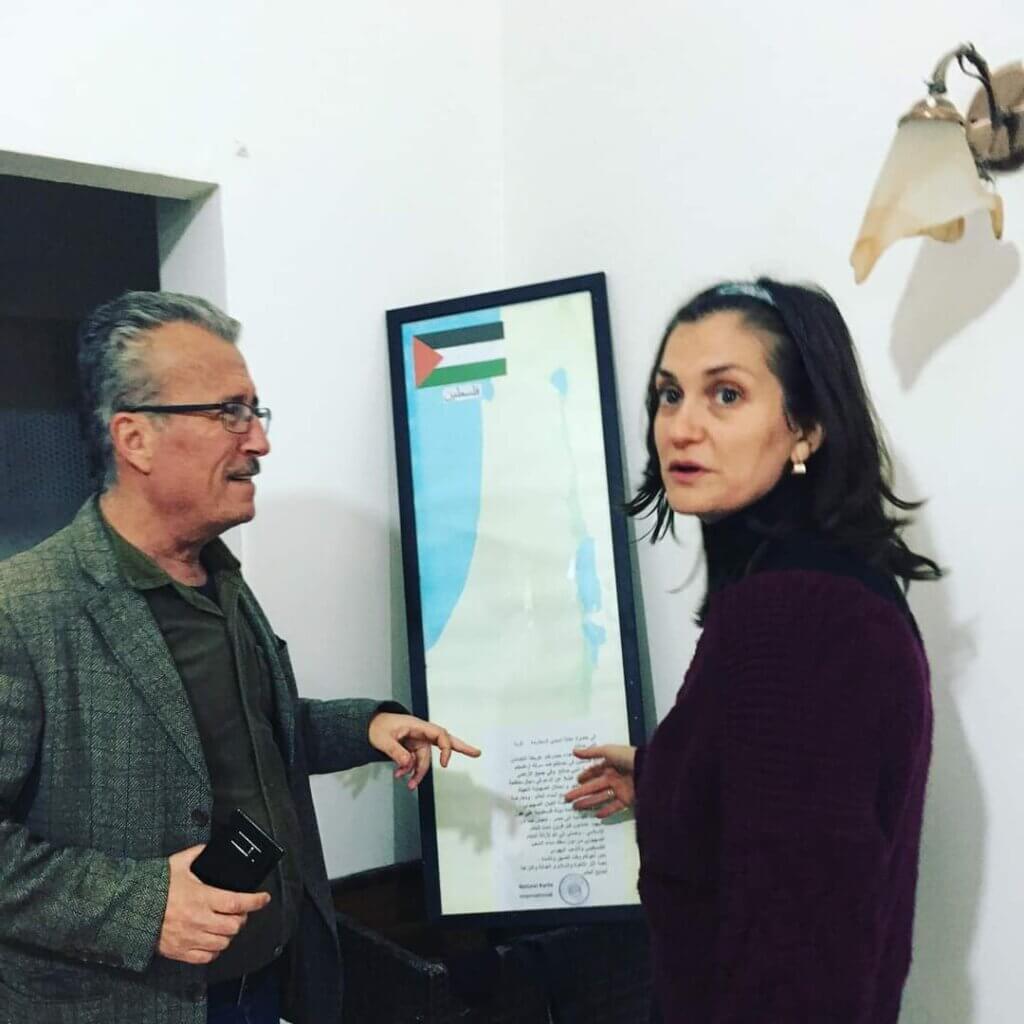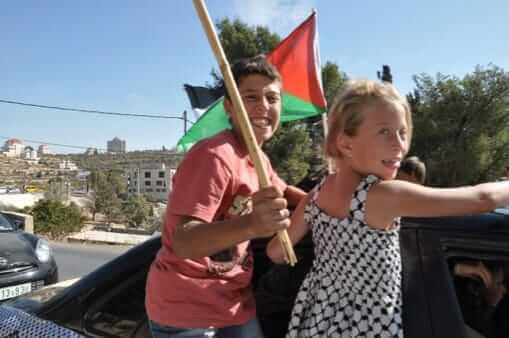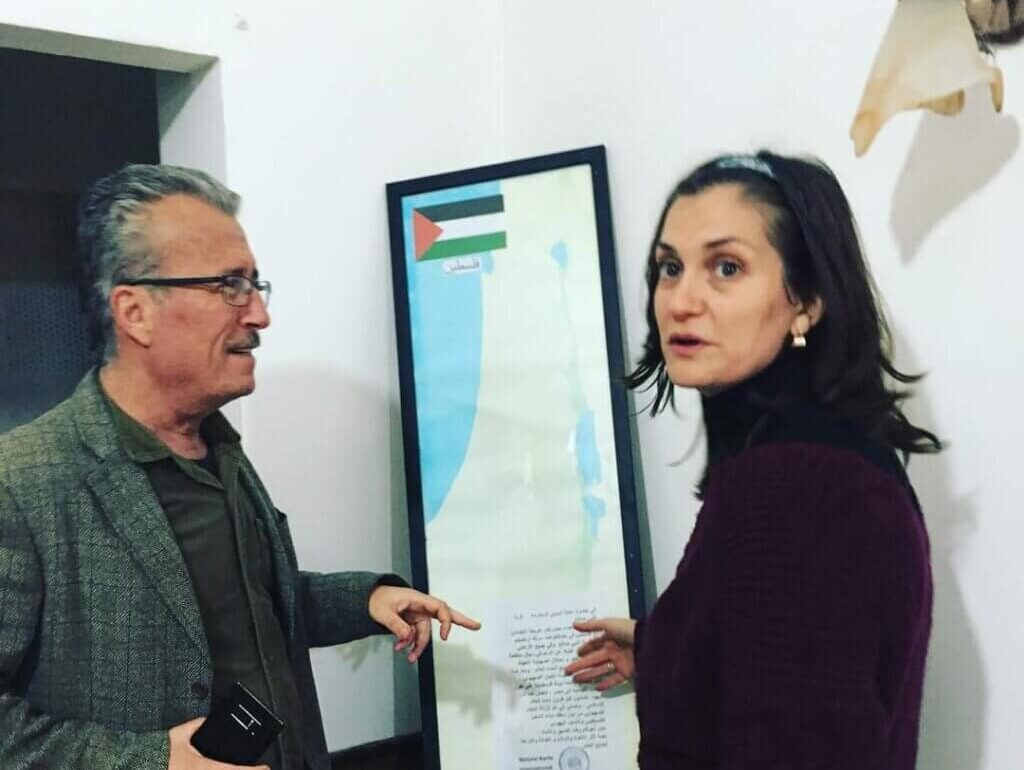I am a Jewish American Israeli, and in Palestine, they call me Alison Tamimi, the chosen sister of Bassem Tamimi, whose own sister was killed by an Israeli translator who pushed her down a flight of stairs in an Israeli military court in 1993, and Auntie of Ahed Tamimi, his daughter and one of Palestine’s most internationally renowned young human rights activists. Over the past 13 years I’ve known the family, they have been separated time and again, with all members of the family spending time in prison for their non-violent activism. At the beginning of November, Bassem was arrested and is being held in Ofer Prison under administrative detention with no charges. Two weeks ago, after a campaign online against her using fake social media accounts to post fake content, Ahed was also arrested and is being held in Damon prison. She has appeared in military court twice since her arrest and has been visibly beaten. She has not had access to a lawyer.
I grew up in the United States in a Jewish community and immigrated to Israel after college after a Birthright Israel trip. After living in Tel Aviv for several years, I wanted to witness Israel’s occupation in the West Bank. I went to a Palestinian protest which had just begun and which would carry on for a decade. That is where I met Bassem and Ahed Tamimi. Though many Israelis told me that I would be lynched because I was a Jew and an Israeli, the majority of Palestinians were unwavering in framing the problem as being with Israel’s policies and practices, not with individuals — not Jewish people, or even Israelis. When we met, Bassem and his family welcomed me, telling me that I was “the most important person to come to their village, because I came to remove the occupation from my mind.”

Removing the occupation from my mind didn’t take too long once I moved to the West Bank at the invitation of Palestinians. I saw firsthand how the Israeli military provokes violence. One time, I was having a tea party and dancing on the roof of a Palestinian home with two five-year-old girls when Israeli soldiers invaded the village. They watched us dancing on the roof for several minutes, before looking me straight in the eyes and shooting tear gas directly at us. Another time, I was with a group of children drawing chalk peace signs on the road when an army jeep drove up and threw sound grenades at us. When I slept over at a friend’s house, the Israeli military came in the middle of the night and trashed the entire house. They insisted on taking photos of the children, which an Israeli soldier later confessed on This American Life was not for collecting information, but as a tactic to terrorize people in their homes. Thousands of stories like these have been shared by Palestinians, Israelis (including soldiers) and international advocates for decades with the world.
When I first met Ahed Tamimi, she was focused on a Rubik’s cube she was playing with in a field during a violent incursion of the Israeli military in her village. She was eight years old. A few months later, she tagged along to the photography class that I organized for 12-14-year-old children with the international humanitarian organization World Vision. Over the course of the six-week class, every single one of the students was abducted by the Israeli military. Most of them were tortured. It is rare to find a child in the West Bank who has not been arrested by the Israeli military at least once, if not multiple times, during their childhood. While human rights organizations document the number of children in Israeli military and administrative detention, the number of children arrested is too vast for any human rights organization to document.

Over the course of the fifteen years that I was living and working with Palestinians in Israel, the West Bank, Jerusalem, and Gaza, I witnessed how Israel targets non-violent movements and activists and systematically robs people of their ability to live peaceful private lives. I watched in 2018, during the Great March of Return, when tens of thousands of young Gazans marched to call for their human rights, how Israel killed 223 of them, including medics and journalists, and injured 29,000 people. Three weeks ago, Israel killed five family members of the Palestinian poet and writer Ahmed Abu Artema, who was widely credited for inspiring the Great March of Return. Since October 7, thousands of Palestinians have been detained by Israel, including journalists, academics, artists, and members of the Palestinian legislative council. When people that I loved were killed and harmed by Israeli military violence, I felt the depth of grief that can transform your love for humanity into hatred. I’m sure that all people are capable of feeling this pain and that Israel intends for Palestinians to feel the pain that sows the seeds of hatred.
If anyone is wondering where the Palestinian Gandhis are, the answer is that they are kidnapped and taken to unknown locations where they are being tortured, sitting in military and administrative detention in Israeli prisons, killed in cold blood on the way home from school, dying of treatable wounds in destroyed hospitals, buried under the rubble of vengeance in Gaza. Despite this, there are many who will continue to grow up in Palestine’s long-standing culture of resistance. The fact that the overwhelming majority of Palestinian people have remained steadfast for so long is a miracle of the human spirit. Extensive anti-Palestinian propaganda perpetuated by Israel and racist mainstream media coverage for decades should not rob humanity of knowing about some of the greatest activists in modern history.
At Mondoweiss, we understand the power of telling Palestinian stories. For 17 years, we have pushed back when the mainstream media published lies or echoed politicians’ hateful rhetoric. Now, Palestinian voices are more important than ever.
Our traffic has increased ten times since October 7, and we need your help to cover our increased expenses.
This post was originally published on this site be sure to check out more of their content.







